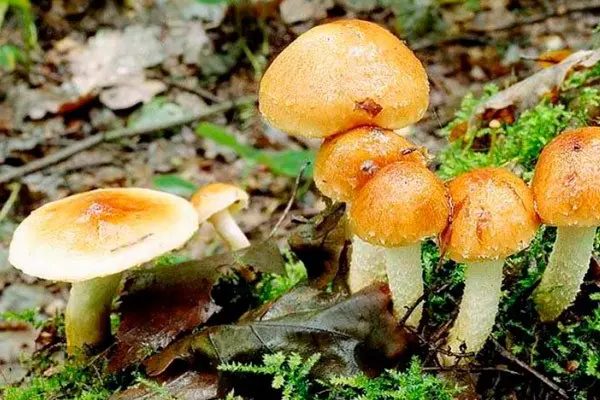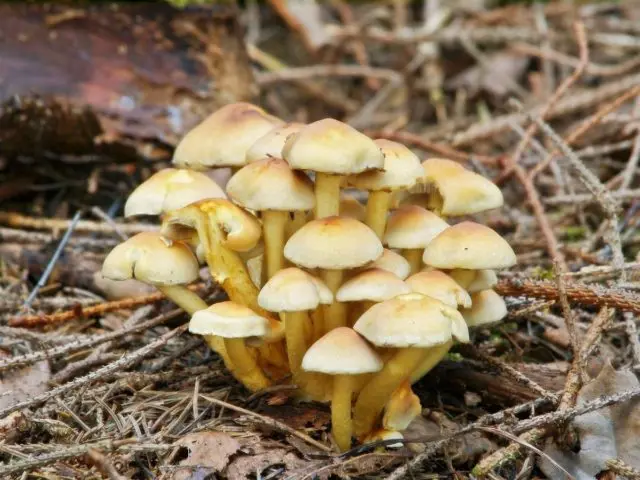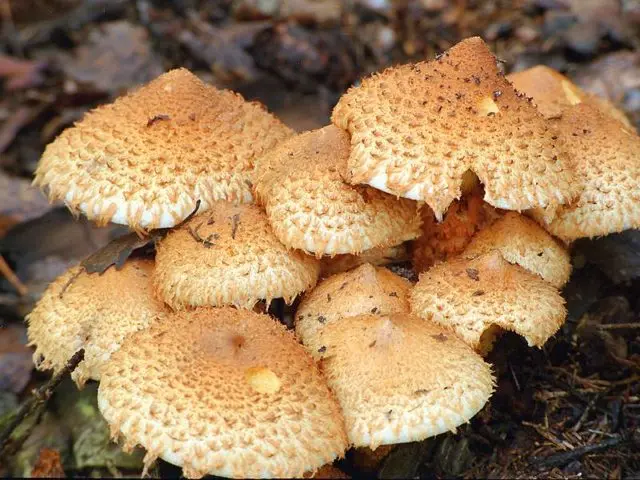Contents
Royal honey agaric, or golden flake, in Our Country is not considered a valuable mushroom, which mushroom pickers “hunt” with passion. But in vain, because it has a fairly high taste and medicinal properties. The main thing is to distinguish it in the forest from inedible representatives of the mushroom family.
Description of the golden flake
Golden scale, or royal honey agaric (as well as Pholiota aurivella, willow, thick or greasy scale) looks really luxurious: a large bell-shaped hat covers a thin stem with tiny scales. The size of the mushroom is 10 – 15 cm in height, but as it grows, the cap of the golden flake reaches truly royal sizes – up to 20 cm and, unlike many poisonous counterparts, does not change shape as it increases in size.
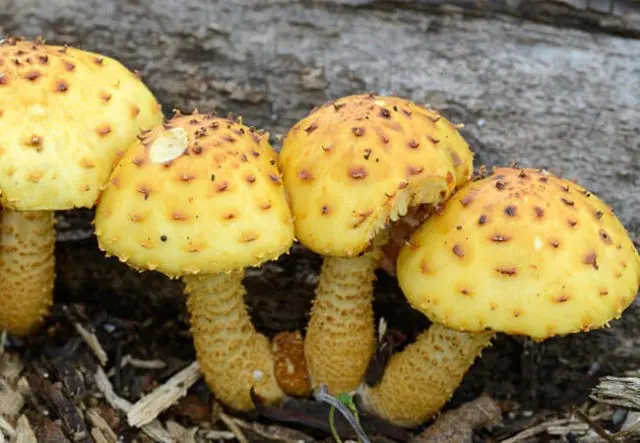
Cap Description
The cap of a young mushroom is bell-shaped, 5-6 cm in diameter, yellow in color with various shades of sand or rusty. From above it is covered with small flaky scales of a darker color than the color of the cap. During further growth, the hat straightens and takes on the shape of a wide bell. The lamellar hymenophore is hidden behind a white veil in young individuals, subsequently the veil is torn, leaving only a light felt fringe along the edge of the cap. As it grows, the dark scales on the cap become less noticeable.
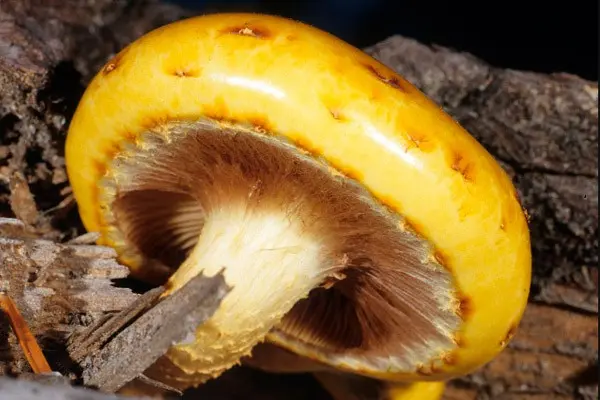
Description of the leg
The leg of the flake is golden, up to 10 cm long, up to 1,5 cm in diameter, yellowish-brown in color, completely covered with felt scales of a darker color, as clearly demonstrated in the photo of the mushroom. In young representatives, there is a ring on the leg formed from a rupture. In adults, the ring is absent.
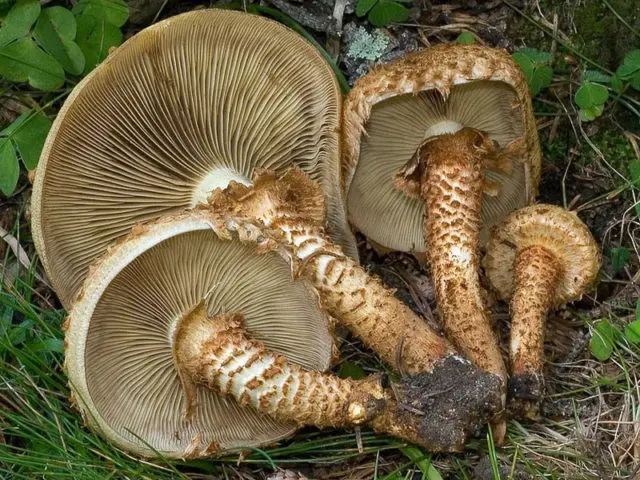
Is golden flake edible or not
Royal mushroom belongs to the fourth category of mushrooms, which will be designated the minimum value from a gastronomic point of view. However, it is not only edible, but also beneficial to human health, as it has medicinal properties. The pulp of the mushroom has a somewhat specific taste, which is easily eliminated after a short soaking for 2 to 4 hours. With proper preparation, the taste of royal mushrooms is quite high. However, before cooking of any kind, they must be boiled.
How to cook golden flake
Main dishes and pickled preparations are prepared from golden flakes, however, only after preliminary boiling of mushrooms for 15-20 minutes. They go well with meat, potatoes and vegetables. Suitable for making stews, fillings for pies and mushroom platter. Mushrooms are harvested for the winter table in various ways:
- dried;
- salt;
- marinate.
Stewed dishes from royal mushrooms with the addition of milk or sour cream have high palatability.
How to pickle golden flake
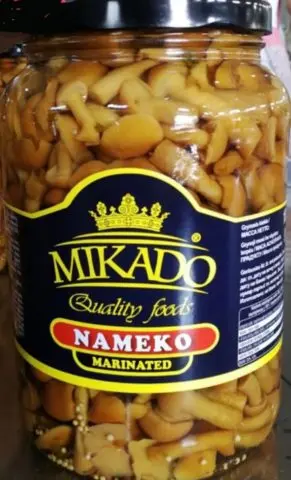
Marinating the golden flake is the most popular way to cook it. At home, you can prepare conservation, which will not yield to the taste of the store.
The algorithm of actions is as follows:
- Mushrooms are cleaned, sorted by size, washed thoroughly and boiled in salted water for 20-25 minutes.
- Throw in a colander, let the water drain.
- Lay out in prepared, pre-sterilized jars.
- Add cloves, bay leaf, peppercorns, peeled garlic cloves.
- Prepare the marinade: for 1 liter of water add 2 tbsp. l. sugar, 2,5 tbsp. l. non-iodized salt. After boiling, add table vinegar – 4 – 5 tbsp. l.
- Prepared flakes are poured with marinade and immediately rolled into jars.
How to fry golden flakes with onions
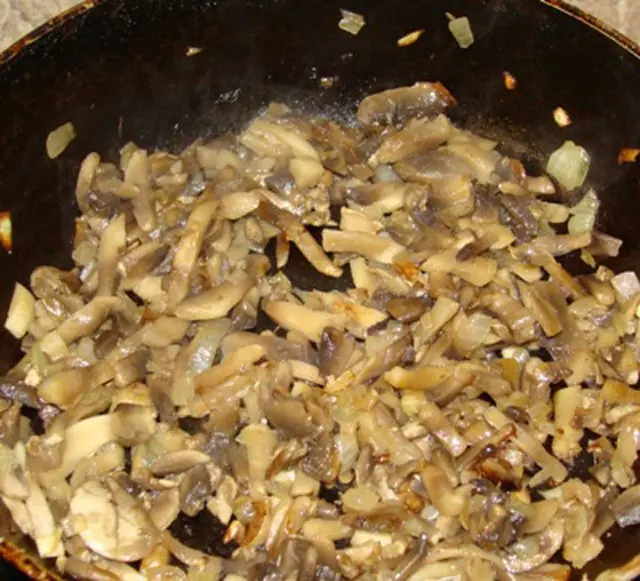
Cooking the lightest and at the same time delicious dish from golden flakes will not take much time, but it will provide invaluable benefits to the body. Cooking algorithm:
- Mushrooms brought from the forest are cleaned, washed and boiled in salted water for 20-25 minutes.
- The mushroom mass is thrown into a colander, the water is allowed to drain completely and placed in a pan with vegetable oil.
- Fry over high heat under a closed lid.
- When the moisture evaporates, add onion rings, salt and pepper.
- The dish is brought to readiness and immediately served on the table.
Healing properties of golden flakes
Golden flake contains:
- vitamins;
- amino acids and minerals;
- fats;
- proteins;
- large amounts of phosphorus and calcium.
There are more useful components in royal mushrooms than in many other mushrooms by 2-3 times. Therefore, we can say with confidence that representatives of this species bring invaluable benefits to the human body. The healing properties of royal mushrooms are in the immunomodulatory effect, as well as a beneficial effect on brain activity and the ability to restore vitality. Mushrooms are also useful for anemia.
Where and how to grow
The edible golden flake mushroom grows throughout Our Country, as well as in Asia, Europe, Australia and America. Active growth falls on the period from mid-August to the end of September. Honey mushrooms prefer deciduous, coniferous and mixed forests, where they are located in large numbers on rotten stumps, rotting fallen trees, soddy soil overgrown with grass. It grows in especially large quantities in Primorye, where it pleases mushroom pickers from early summer until late autumn.
Twins of the golden flake and their differences
False twins of the golden flake:
- Mucous flake – is very similar to its edible counterpart, but with age, the edges of its cap rise. Mushrooms are covered with mucus during the rainy season, have a small number of scales on the cap. They grow near deadwood or on rotten wood. The variety is inedible.

- False royal honey agaric, whose hemispherical cap has a richly bright color and is also covered with scales, and straightens with age. However, it lacks the rings characteristic of edible species. False honey agaric is poisonous.

- common flake has a very similar appearance to the golden representative of the family. It is distinguished by a pale color, in comparison with the golden flake. The mushroom is medicinal, used for medical purposes.Important! The product contains opium, so it is not recommended to eat it.

Useful video will not allow you to confuse the flake with twins during a quiet hunt
Conclusion
The golden flake, despite what is called the royal honey agaric, is not its counterpart and belongs to a completely different family. However, mushroom pickers undeservedly bypass these mushrooms: this species is not inferior to mushrooms in terms of taste and healing properties.










